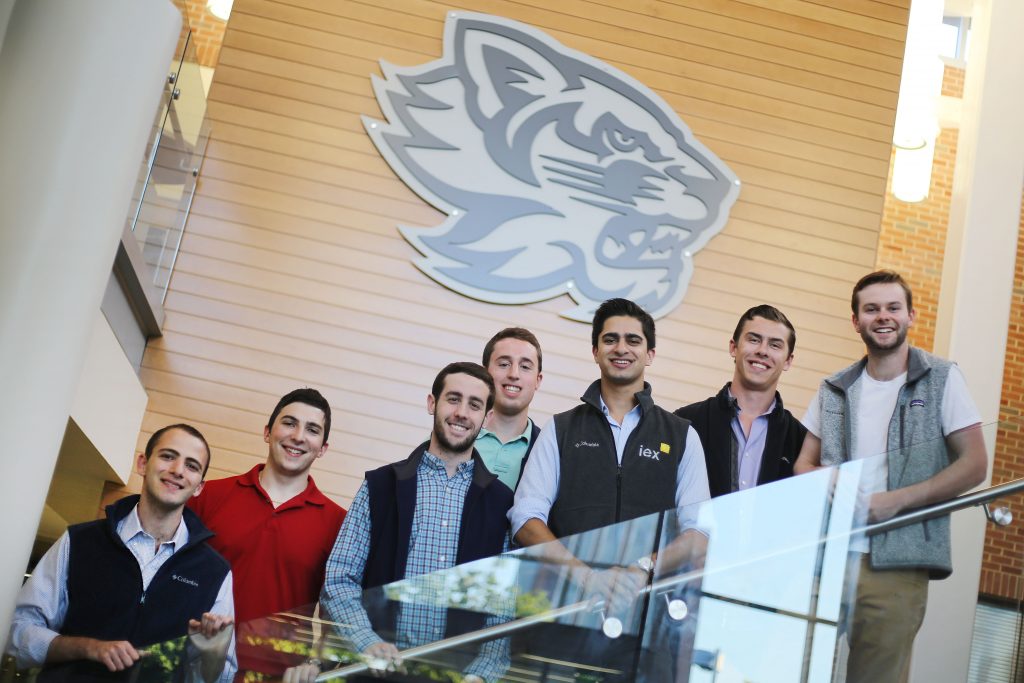
A group of students at Binghamton University are getting a taste of careers in finance through an opportunity to manage a $300,000 investment portfolio.
The Binghamton Investment Fund, which was created by School of Management (SOM) students, was originally a class offered for credit. Now, under the supervision of Dennis Lasser, an associate professor of finance, and Upinder Dhillon, the dean of SOM, the program has turned into a hands-on opportunity for students to get real-world experience.
The team is comprised of nine senior analysts, or section heads, who cover different sectors of the stock market. Each of them is responsible for focusing on stocks within a specific industry and finding which company’s stocks are rising and falling in order to allocate the money. The fund’s current biggest holding is NextEra Energy, followed by Phillips 66, Facebook, Lockheed Martin and Verizon.
Each senior analyst has a team of two junior analysts, which is comprised of sophomores and juniors. The senior analysts delegate work to the junior analysts, who help them make decisions on where to purchase stocks. The students then pitch the allocation of the money, and the ultimate purchasing decision is up to the faculty advisers.
Ronick Sanon, a senior analyst with the fund and a senior double-majoring in economics and psychology, said that it’s a great way for underclassmen to get involved in finance and gain notable experience for their resumes.
“For people in SOM, there’s a major trend toward accounting,” Sanon said. “We’re trying to make sure kids know if you want a really highly rewarding job in finance it’s extremely possible. The best thing to do is get involved in this fund as well as Finance Society.”
Dhillon said that the change from a class to the current model of the fund is part of a larger shift within SOM toward experiential, hands-on learning, which tends to stay with people longer than memorizing content in a classroom. He also said the connection between upperclassmen and underclassmen is important because the older students are able to mentor and teach their younger counterparts.
“It exposes them to real-world professionals who identify talent and then recruit them,” Dhillon said. “If the goal is to work in a lead investment bank in the country, then you must go through this experience.”
Eric Hurd, a senior analyst with the fund and a senior majoring in business administration, said he encourages freshmen to apply in order to be exposed to BU’s rising presence in the world of finance.
“We see the fund as the catalyst that will bridge the gap between recruiting for Binghamton students and Ivy League students for front office roles,” Hurd said.
Applications will open for junior analyst positions later this semester. There are currently 20 junior analysts who demonstrated interest and experience in case competitions through the Finance Society and were chosen by the faculty advisers and founding senior analysts.
When the class started about 15 years ago, there was a $100,000 portfolio. The transition from the class to the current model of the fund officially went into effect at the start of the fall 2016 semester, and the money for the fund comes from alumni donations to SOM.
Joseph Powers, a senior analyst with the fund and a senior majoring in business administration, said his greatest hope for the fund is for younger students to realize the finance program’s reputation is rising fast and to be compelled to get involved.
“This is work directly applicable to what they would be doing full-time,” Powers said. “We’re taking hundreds of thousands of dollars and putting them in stocks that would give them investments. This isn’t a little mock club being run out of a basement somewhere here on campus. This is real money, real work. And alumni are noticing.”


